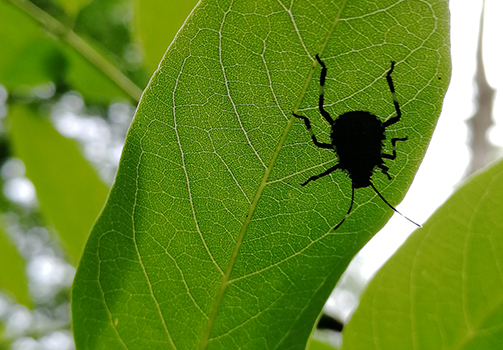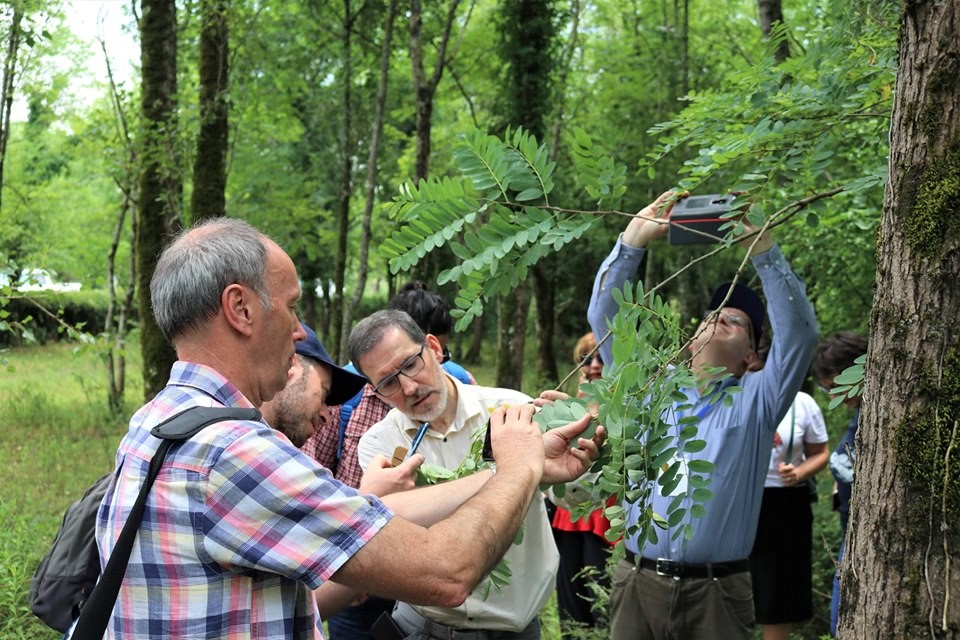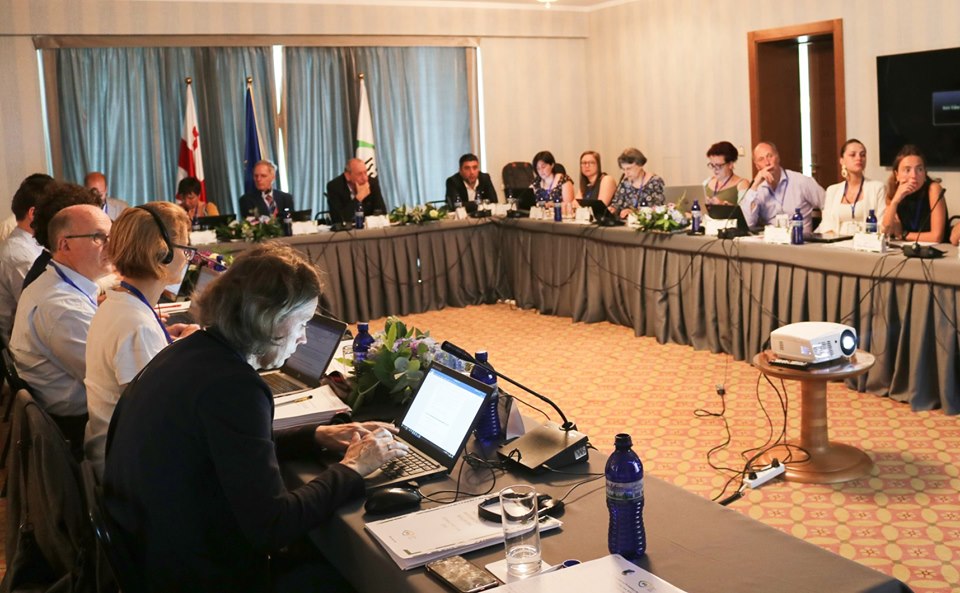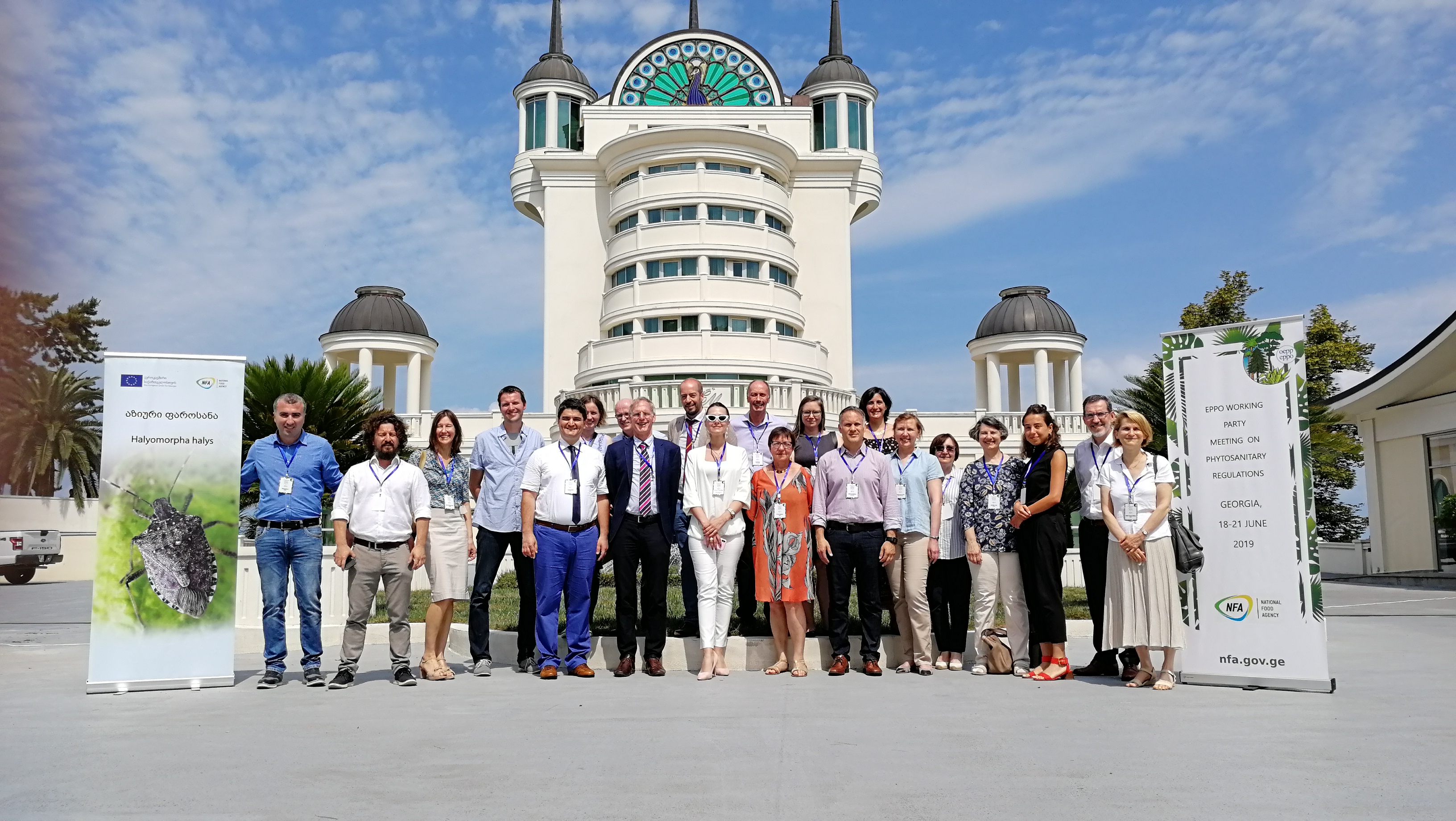
57th Meeting of the Working Party on Phytosanitary Regulations
Batumi (GE), 2019-06-18/21
The 57th Meeting of the Working Party on Phytosanitary Regulations took place in Batumi, Georgia, on 2019-06-18/21 at the kind invitation of the NPPO of Georgia. There were 19 participants from 12 EPPO countries and 2 observers from the European Commission and USDA-APHIS. This EPPO Working Party directs and supervises the technical work of many EPPO Panels related to plant health. A summary of the different Panel meetings and Workshops which took place since the last meeting was presented to the Working Party (short summaries of these meetings are posted on this website). The Working Party also discussed the work programme for 2020 and made several recommendations that will be presented to the EPPO Council.


New and revised EPPO recommendations and Standards
The Working Party recommended that 3 new pests (including 1 invasive alien plant) should be added to the EPPO A2 List of pests present in the region and recommended for regulation as quarantine pests: Agrilus bilineatus, A. fleischeri and Ambrosia trifida. For each pest, recommended phytosanitary measures are described in a Pest Risk Analysis.
The following changes were also recommended by the Panel on Phytosanitary measures:
-
- Rename Verticillium albo-atrum (hop-infecting strains) as V. nonalfalfae in the EPPO A2 List,
- Rename Ceratocystis fagacearum as Bretziella fagacearum in the EPPO A1 List,
- Synonymization of Bactrocera invadens, B. papayae and B. philippinensis with B. dorsalis: this will require the deletion of B. invadens, B. papayae and B. philippinensis from the EPPO A1 List.
16 new and revised Standards were considered ready to be presented for approval at Council:
- General Phytosanitary Measures (series PM1)
- EPPO A1 and A2 Lists of pests recommended for regulation as quarantine pests (revision introduction of PM 1/2)
- Phytosanitary Procedures (series PM3)
- Raising public awareness of Quarantine and Emerging Pests (new)
- Post-entry quarantine for potato (revision PM 3/21)
- Monitoring and consignment inspection of wood chips, hogwood and bark for quarantine pests (new)
- Pest-free areas and pest-free production and distribution systems for quarantine pests of potato (revision PM 3/61)
- Production of pathogen-free microplants of potato (revision PM 3/62)
- Production of pathogen-free minitubers of potato (revision PM 3/63)
- Meloidogyne chitwoodi and M. fallax: sampling potato tubers for detection (revision PM 3/69)
- Diagnostics (series PM7)
- Specific requirements for laboratories preparing accreditation for a plant pest diagnostic activity (revision PM 7/981)
- Documentation and reporting on a diagnosis (revision PM 7/771)
1 depending on the result of a country consultation after the meeting)
- Commodity-specific Phytosanitary Measures (series PM8)
- Fraxinus (new) 2
- Juglans (new) 2
- Ulmus (new) 2
2 if this is possible to address all the comments by the Working Party before the Council
- National Regulatory Control Systems (series PM9)
- ‘Candidatus Liberibacter’ species that are causal agents of Huanglongbing disease of citrus and their vectors: procedures for official control (new)
- Heterobasidion irregulare: procedures for official control (new)
- Ailanthus altissima (new)
The Working Party also noted the adoption of the following Diagnostic Protocols approved since its last meeting according to the specific fast-track procedure:
-
- PM 7/24 (3) Xylella fastidiosa
- PM 7/XX (1) Thaumatotibia leucotreta

Information services and EPPO codes
Work carries on EPPO Codes, in particular in relation to ePhyto.
The Working Party supported the process proposed to revise the EPPO datasheets. It also agreed that work should be done to progressively include references for host plants to EPPO Global Database (GD).
Now that the automatic transfer for EU countries from Europhyt-outbreaks to EPPO is working, the Working Party supported that the Secretariat now begins to work on the transfer of pest reports to the IPPC.
Diagnostics
The Working Party was briefed on the main achievements of the four Panels and the Workshop on Diagnostics held since the last meeting.
The EPPO Secretariat presented the progress made with the transfer of Q-bank to EPPO (now EPPO-Q-bank ![]() ). The EPPO-Q-bank database was launched on the 1st of May 2019.
). The EPPO-Q-bank database was launched on the 1st of May 2019.
The Working Party recognized the urgency to revise the EPPO Standards PM 7/98 Specific requirements for laboratories preparing accreditation for a plant pest diagnostic activity and PM 7/77 Documentation and reporting on a diagnosis to align these with the revision of the ISO 17025 Standard approved in 2017-12-13 and for which implementation will be required by 2020-12-01. A deviation from the normal approval procedure for these horizontal Standards was accepted. The revision of PM 7/76 also includes several points that are relevant for reporting High Throughput Sequencing (HTS) results.
PRA activities
The development proposal to allow non-EPPO countries to add PRAs to the EPPO platform on PRA ![]() was presented and agreed, provided that non-EPPO NPPOs and RPPOs are involved. The platform will first be presented at the next Technical Consultation among RPPOs.
was presented and agreed, provided that non-EPPO NPPOs and RPPOs are involved. The platform will first be presented at the next Technical Consultation among RPPOs.
The Working Party also approved the horizontal measures on non-coniferous wood recommended in the EPPO Study on bark and ambrosia beetle.
The Working Party agreed that Expert Working Groups for PRA should be organized for Tomato brown rugose fruit virus, Gymnandrosoma aurantianum and Amaranthus palmeri. The work on the draft Guidelines on the design and implementation of a buffer zone is also a clear priority for 2020. Further discussion on the scope for an EWG on viruses of grapevine breeding material as well as on an EWG on risk management measures for Meloidogyne species will are scheduled at next meeting on the Panel on Phytosanitary Measures.
Certification of plant for planting material
The Working Party agreed to reactivate the activity on PM 4 Standards on Production of healthy plants for planting in 2021 on a list of identified priorities.
Biological Control Agents
The Working Party agreed with the Panel proposal to add Trichopria drosophilae and Propylea quatuordecimpunctata to Standard PM 6/3 List of biological control agents widely used in the EPPO region and was supportive of the development of an EPPO Platform to exchange information on national assessments and releases of BCAs.
Projects
The Working Party was informed on the progress of projects in which EPPO is/was recently involved:
Plant Health Links in the EPPO Region
The following issues were discussed:
- ePhytos
- EPPO activities in the context of the international Year of Plant Health 2020
- EPPO input on IPPC work on Commodity Standards
- IPPC Sea container task force
-
Progress in the implementation of the EU Regulation 2016/2031 "On protective measures against pests of plants"
- Collaboration between EFSA and EPPO
- Euphresco
Review and improvement of EPPO processes
A new Strategic plan should be approved for 2021-2025. The draft Strategic Plan was discussed and amended. It will be presented for further discussion to the Executive Committee and Council.
The next Working Party on Phytosanitary Regulations is due to convene in Madeira (Portugal) on 2020-06-16/19, including a joint session with the Working Party on Plant Protection Products to help improving links between phytosanitary regulations and plant protection products policy.

